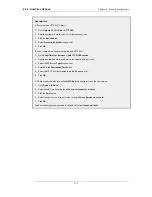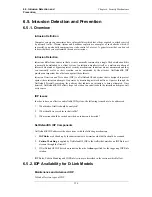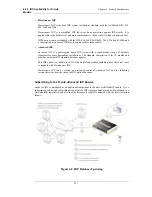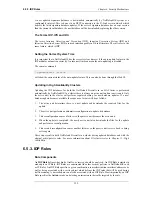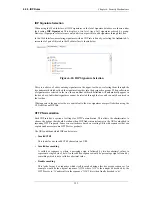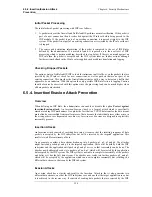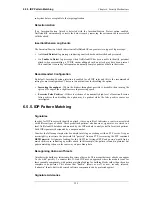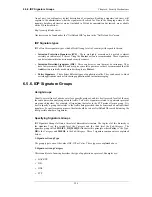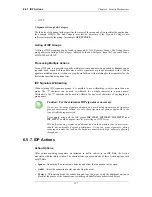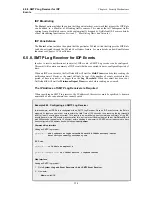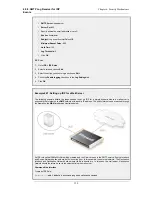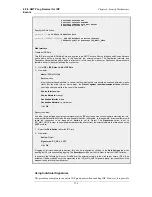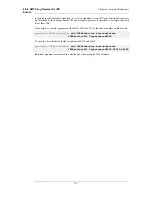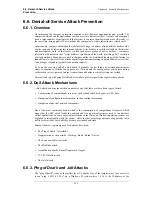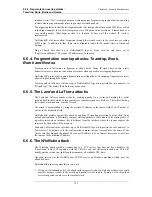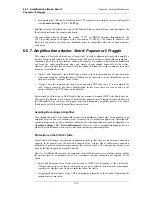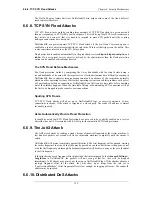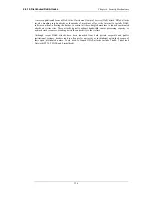
intended victim. "Jolt" is simply a purpose-written program for generating such packets on operating
systems whose ping commands refuse to generate oversized packets.
The triggering factor is that the last fragment makes the total packet size exceed 65535 bytes, which
is the highest number that a 16-bit integer can store. When the value overflows, it jumps back to a
very small number. What happens then is a function of how well the victim's IP stack is
implemented.
NetDefendOS will never allow fragments through that would result in the total size exceeding
65535 bytes. In addition to that, there are configurable limits for IP packet sizes in Advanced
Settings.
Ping of death will show up in NetDefendOS logs as drops with the rule name set to
"LogOversizedPackets". The sender IP address may be spoofed.
6.6.4. Fragmentation overlap attacks: Teardrop, Bonk,
Boink and Nestea
Teardrop and its followers are fragment overlap attacks. Many IP stacks have shown erratic
behavior (excessive resource exhaustion or crashes) when exposed to overlapping fragments.
NetDefendOS protects fully against fragmentation overlap attacks. Overlapping fragments are never
allowed to pass through the system.
Teardrop and its followers will show up in NetDefendOS logs as drops with the rule name set to
"IllegalFrags". The sender IP address may be spoofed.
6.6.5. The Land and LaTierra attacks
The Land and LaTierra attacks works by sending a packet to a victim and making the victim
respond back to itself, which in turn generates yet another response to itself, etc. This will either bog
the victim's machine down, or make it crash.
The attack is accomplished by using the victim's IP address in the source field of an IP packet as
well as in the destination field.
NetDefendOS protects against this attack by applying IP spoofing protection to all packets. In its
default configuration, it will simply compare arriving packets to the contents of the routing table; if
a packet arrives on an interface that is different from the interface where the system expects the
source to be, the packet will be dropped.
Land and LaTierra attacks will show up in NetDefendOS logs as drops with the rule name set to
"AutoAccess" by default, or if the configuration contains custom Access Rules, the name of the
Access rule that dropped the packet. The sender IP address is of no interest here since it is always
the same as the destination IP address.
6.6.6. The WinNuke attack
The WinNuke attack works by connecting to a TCP service that does not have handlers for
"out-of-band" data (TCP segments with the URG bit set), but still accepts such data. This will
usually put the service in a tight loop that consumes all available CPU time.
One such service was the NetBIOS over TCP/IP service on Windows machines, which gave the
attack its name.
NetDefendOS protects against this in two ways:
•
With a careful inbound policy, the attack surface is greatly reduced. Only exposed services could
possibly become victims to the attack, and public services tend to be more well-written than
services expected to only serve the local network.
6.6.4. Fragmentation overlap attacks:
Teardrop, Bonk, Boink and Nestea
Chapter 6. Security Mechanisms
333
Summary of Contents for DFL-1600 - Security Appliance
Page 27: ...1 3 NetDefendOS State Engine Packet Flow Chapter 1 NetDefendOS Overview 27 ...
Page 79: ...2 7 3 Restore to Factory Defaults Chapter 2 Management and Maintenance 79 ...
Page 146: ...3 9 DNS Chapter 3 Fundamentals 146 ...
Page 227: ...4 7 5 Advanced Settings for Transparent Mode Chapter 4 Routing 227 ...
Page 241: ...5 4 IP Pools Chapter 5 DHCP Services 241 ...
Page 339: ...6 7 Blacklisting Hosts and Networks Chapter 6 Security Mechanisms 339 ...
Page 360: ...7 4 7 SAT and FwdFast Rules Chapter 7 Address Translation 360 ...
Page 382: ...8 3 Customizing HTML Pages Chapter 8 User Authentication 382 ...
Page 386: ... The TLS ALG 9 1 5 The TLS Alternative for VPN Chapter 9 VPN 386 ...
Page 439: ...Figure 9 3 PPTP Client Usage 9 5 4 PPTP L2TP Clients Chapter 9 VPN 439 ...
Page 450: ...9 7 6 Specific Symptoms Chapter 9 VPN 450 ...
Page 488: ...10 4 6 Setting Up SLB_SAT Rules Chapter 10 Traffic Management 488 ...
Page 503: ...11 6 HA Advanced Settings Chapter 11 High Availability 503 ...
Page 510: ...12 3 5 Limitations Chapter 12 ZoneDefense 510 ...
Page 533: ...13 9 Miscellaneous Settings Chapter 13 Advanced Settings 533 ...

